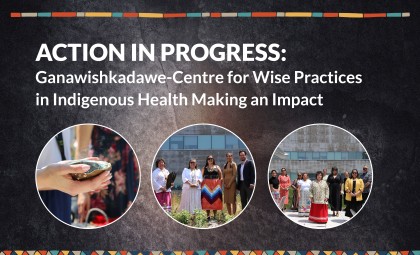Action in Progress: Ganawishkadawe-Centre for Wise Practices in Indigenous Health Making an Impact

At HIROC, knowledge sharing is a fundamental component of how our Reciprocal model works.
It’s all about sharing lessons learned across the Reciprocal, all with the goal of seeing those initiatives and innovations scaled right across the country. The results – seeing an engaged healthcare community joining us on our collective journey to turn the corner on patient safety.
We recently learned how the team at Women’s College Hospital (WCH) is making an impact through expanding access to traditional medicines and ceremony for First Nations, Inuit, and Métis patients through the Ganawishkadawe-Centre for Wise Practices in Indigenous Health (GCWP-IH).
To find out more about this superb initiative and how it's breaking down barriers in healthcare, we had the privilege of speaking with the Elder-in-Residence and Traditional Healer Kawennanoron Cynthia White to ask a couple of questions:
What’s been the feedback on this new program from the community so far?
“The feedback from the community has been positive. This year, we’ve focused on expanding our scope through new programs, meaningful action, and communication,” said White.
“As we continue to expand and share news of these services, we’re excited to invite even more First Nations, Inuit and Métis patients into the Centre.”
Can you share a bit about what’s been happening at the Centre?
“We’ve had so much important and exciting news coming out of the Centre over the last year, including the expansion of services like; our integration into EPIC; the opening of our own Medicine Garden; and the inclusion of smudge kits to key clinics at Women’s College Hospital,” said White.
“Now, we’ve started to see patients be referred to the Centre via the other clinics in the hospital because of this continued forward momentum. It’s important to us that the patients are aware of these programs, and these referrals are a step in the right direction.”
While we chatted, we wanted to continue our learning and asked for additional information and definitions. Here’s what we learned:
The Indigenous Peer Support and Relations Advocate nurtures a collective sense of community for Indigenous patients and their families, collaborating alongside the GCWP-IH, Elder in Residence.
WCH’s Elder-in-Residence offers wisdom, support, guidance, and ceremony rooted in spiritual truths of the Indigenous people, nations, and communities they serve. They also contribute to the well-being of the GCWP-IH and its staff by offering ceremonies of healing. The Elder-in-Residence works alongside the Indigenous Peer Support and Relations Advocate to improve healthcare providers’ understanding of Indigenous peoples’ needs and health systems.
The Indigenous Peer Support and Relations Advocate and the Elder-in-Residence provide culturally relevant support and advocacy for First Nations, Inuit, and Métis patients and their families through the Ganawishkadawe Centre for Wise Practices in Indigenous Health at Women’s College Hospital.
The Indigenous Peer Support and Relations Advocate can provide, but are not limited to, the following services:
- One-on-one peer support
- Coordinating access to Indigenous community partners and organizations
- Facilitating supports including cultural and spiritual needs with Elders-In-Residence for patients and their families
- Accessing traditional medicines
- Collaborating with Community Elders
More information can be found in the video below.
Can’t watch this video? Review your cookie preferences by clicking on the banner at the bottom of the screen or the cookie icon on the bottom left of the screen. Watch on YouTube: https://www.youtube.com/watch?v=nWkZvhUy1ag (YouTube may prevent signed-out users from accessing videos)
It’s all about learning! If HIROC Subscribers are looking to implement a similar service for their community, reach out to us at [email protected] as well as Telena Shena, Manager of Operations at the Ganawishkadawe-Centre for Wise Practices in Indigenous Health, [email protected].
Does your organization have supports in place to provide a safe space for First Nations, Inuit, and Métis patients? We want to hear from you and share your learnings. Reach out to us at [email protected].
By Marc Aiello, Communications and Marketing Specialist, HIROC
